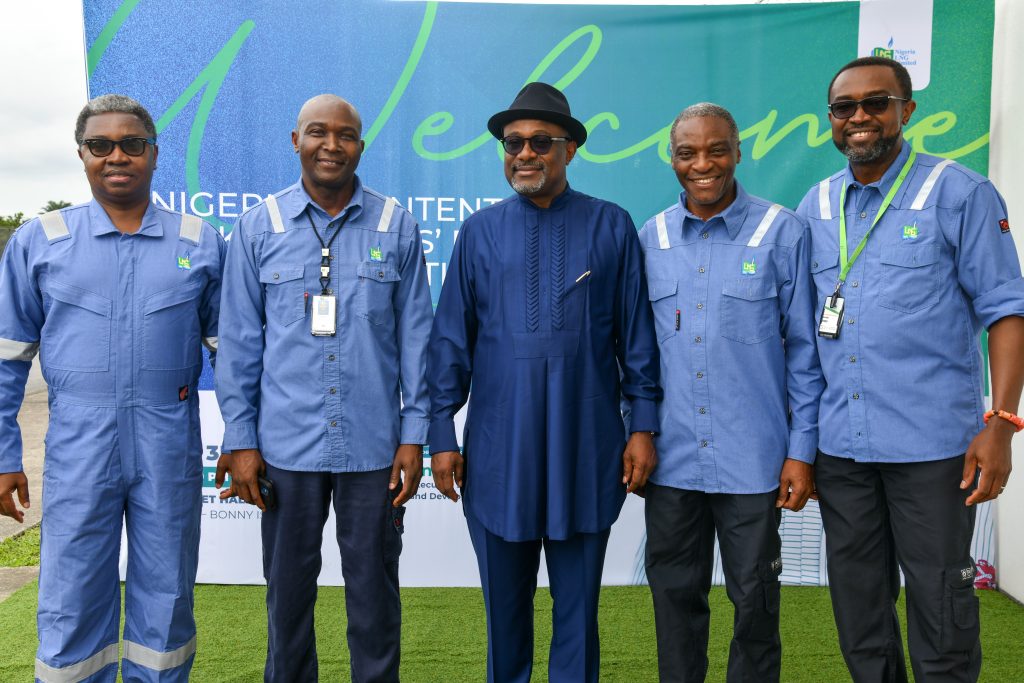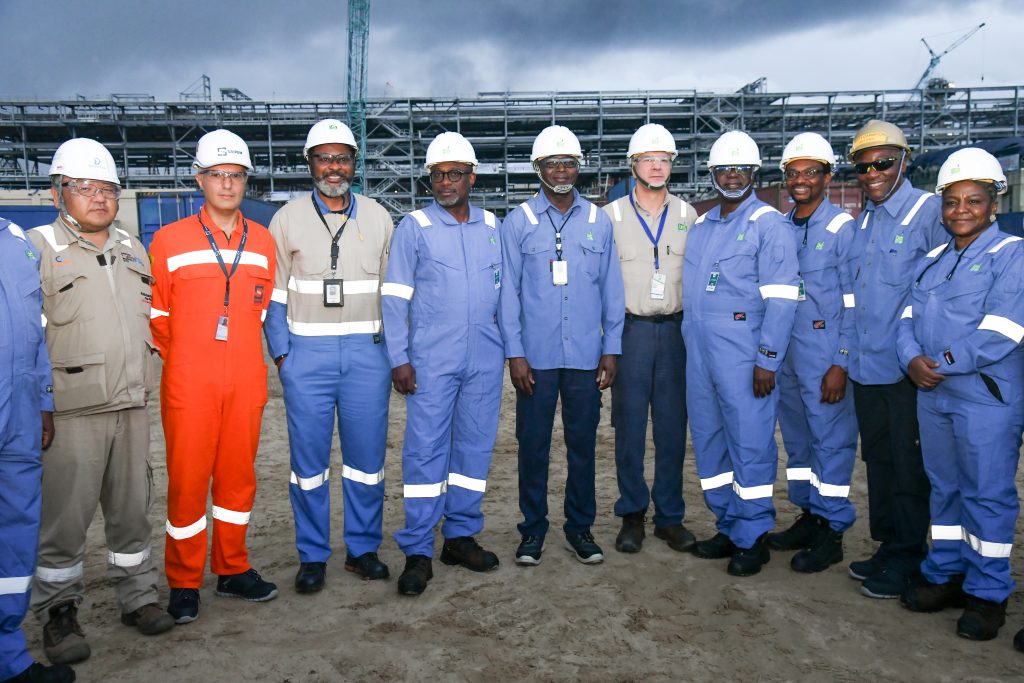News
Train-7 Project Hits 52%, Employs 8,300 Persons NCDMB, NLNG Sign E-Market Place Agreement
AJAGBE ADEYEMI TESLIM
SPONSORED BY: H&H
The ongoing construction of the $5bn Train-7 project being undertaken by the Nigeria Liquefied Natural Gas (NLNG) at Finima, Bonny Island, Rivers State has reached 52 percent and currently engages 8,300 Nigerians of diverse skill sets.
Managing Director, Nigeria Liquefied Natural Gas (NLNG), Dr. Philip Mshelbila and Executive Secretary, Nigerian Content Development and Monitoring Board, Engr. Simbi Kesiye Wabote with senior management of NLNG after inspecting the ongoing Train-7 project at Finima, Bonny Island, Rivers State on Friday as part of the 3-day Nigerian Content Stakeholders Retreat.
These facts emerged on Friday as the Management of the Nigeria LNG Limited led by the Managing Director, Dr. Philip Mshelbila held an engagement session with the Executive Secretary of the Nigerian Content Development and Monitoring Board (NCDMB), Engr. Simbi Kesiye Wabote at the gas company’s operational base at Finima, Bonny Island.
The high-level engagement was part of the three-day Nigerian Content Stakeholders Retreat. The forum provided a platform for the two oil and gas industry leaders to sign an agreement on the Oil and Gas E-Market Place.
The agreement will see the roll out of tender opportunities from the Nigeria LNG Ltd on the E-Market electronic platform, thereby implementing a key provision of the Nigerian Oil and Gas Industry Content Development (NOGICD) Act.
Section 106 of the NOGICD Act defines the “Oil and Gas E-Market Place” as a virtual platform for buyers and sellers of goods and services in the oil and gas industry that allows for speedy and transparent transactions.”
Mshelbila, commented that the relationship between his organization and the NCDMB has been conscientiously nurtured over the years, with both parties striving ceaselessly to fulfil statutory obligations.
‘We recognise the role of the regulator and are happy you recognise that of the operator and the need for regular engagement.”
He acknowledged the crucial role played by the Board in the take-off of the Train-7 project and assured of the company’s resolve to stretch its local content practice beyond mere compliance with the provisions of the Nigerian Oil and Gas Industry Content Development (NOGICD) Act.
He said the company was committed to engaging in initiatives that would boost in-country productivity and economic diversification. “We cannot have a better Nigeria unless we develop the capacities of Nigerians,” he stated, restating the vision of his company to be “a globally competitive LNG company, helping to build a better Nigeria.”
He bemoaned the difficulties the company is facing in getting adequate gas supply and the resultant under-production by its six plants to below 50 percent of their total installed capacity.
He remarked that feed gas to the NLNG plants comes mainly from some its joint ventures (JV) partners, including, Shell Petroleum Development Company (SPDC) Limited, Total Energies and Nigerian Agip Oil Company (NAOC), but their supply pipelines suffer recurrent vandalism, coupled with facility failure and low production from aging wells, resulting in serious disruption of supplies.
The Nigeria LNG, he explained, was exploring several options to mitigate the challenge, including partnering with critical security agencies to curtail vandalism on the pipelines and working with their JV partners to increase their gas production. He added that the Nigeria LNG Board of Directors had also approved for the company to procure gas from other international and indigenous gas producers in the country, with the goal of enhancing the performance of Trains 1-6.
Mshelbila expressed deep concerns that deepwater gas projects that would provide feed gas for the upcoming Train-7 and other future expansions had not been commenced by the international oil and gas companies (IOCs), despite the significant progress made in the construction of the Train-7 plant. This situation, he said, could lead to the completion of the plant without gas being available for it to liquify.
He solicited the Board’s support for the development of the deepwater gas projects, which are critical to keep Trains 1-6 full and provide gas for Train 7 and future expansion plans.
Responding, the Executive Secretary affirmed that the E-Marketplace will be a game-changer, which will enhance the Service Level Agreement (SLA) guiding the relationship between two organisations. He noted that the Board decided to start with NLNG because the company’s record of excellence. He added that the intention of the E-Marketplace is to increase transparency in the tender process, “remove human interference in business processes, move things electronically and achieve better results”.
He described the Final Investment Decision (FID) and other critical steps that were taken for the Train-7 project taken at the height of COVID-19 as a proof of stakeholders’ enthusiasm for the project.
He expressed concern over the challenges of inadequacy of gas supply and promised to support the company along the lines of approving third party gas injectors and sanctioning new deepwater gas projects. He added that “most of the marginal operators have also found gas but part of their challenge is where to send the gas.”
He lauded the NLNG for its remarkable success, recalling that at the initial phases of the company’s take-off “the Management level had 90 per cent expatriates and 10 per cent Nigerians.” However, the table has now turned the other way, with the entire Management now consisting of Nigerians.
On milestones achieved by the foremost gas company since inception, its General Manager, Production, Engr. Nnamdi Anowi, said NLNG has as its core areas of operation – Liquefaction, Transmission, Transportation, Marketing and sales. He disclosed that over 5,770 LNG cargoes have been delivered as of September 2023 and over 500,000 tons of liquefied petroleum gas (LPG) produced and sold to markets overseas and in Nigeria.


